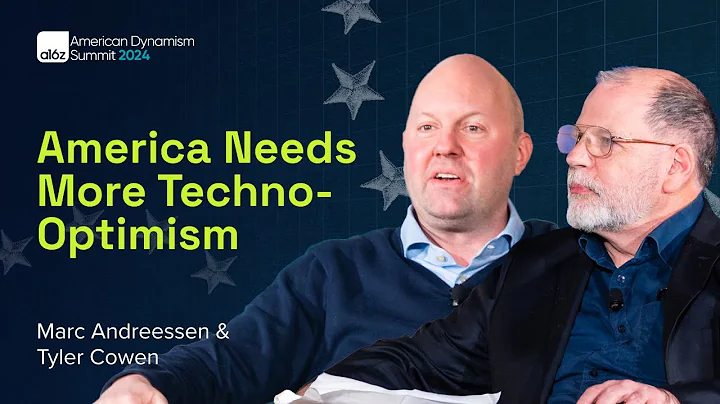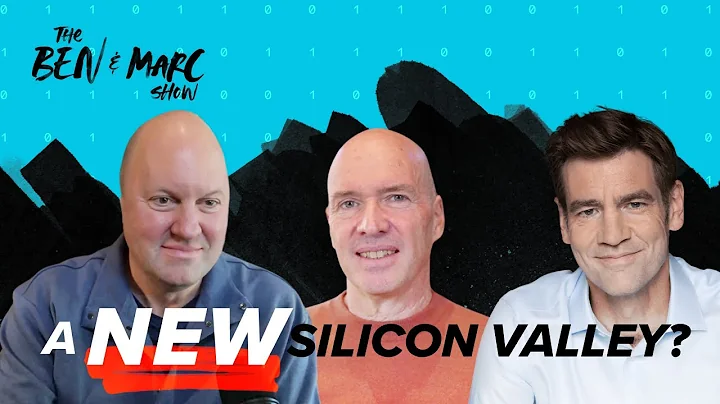a16z's Marc Andreessen and Packy McCormick to coherently explain web3 use cases demonstrates the hollowness of this market, often glossed over by evangelists. I can’t watch cryptocurrencies being owned by upstarts!
By Charlie Warzel

I can't stop watching videos where Web3 evangelists fail to explain the purpose of this technology. I realize that this may also be a villain, but these videos make me feel a deep and inexplicable joy.
I’m talking about two video clips, both posted by Liron Shapira, a technology investor and author and critic of cryptocurrencies and Web3. The first video clip features newsletter writer, investor and advisor Packy McCormick on A16z’s Cryptocurrency Venture Capital team. I recommend you watch this clip before reading further into this article (but I’ll summarize some of it below as well).

Zach Weinberg challenged McCormick, a crypto skeptic, by asking McCormick to reason out why a given problem in might be better solved with Web3 or a blockchain-based project in . McCormick provided the example of a blockchain-based real estate transaction, which he said has not yet been done but is already being touted by him as one of the examples of the "promise" of Web3. McCormick believes that buying property outside of the blockchain is a long and arduous process. He suggested, "Theoretically, you could make all of these things NFTs... You could trade them very quickly, lend and borrow them on global markets, rather than going to Bank of America to get a mortgage. You would With a more open system, people are able to transact in more creative ways."
Weinberg first stress-tested this specific scenario (putting your house on the blockchain), asking: ". What happens in a decentralized system? In a decentralized mortgage market, what happens if mortgage lenders can’t get their money back? Basically, lenders can take action through the courts, replied McCormick Legal action. They went back and forth about smart contracts, and Weinberg pressed McCormick each time with some version of the same question: What makes this blockchain version of the product better than the current Web2 solution? McCormick doesn't? Answer. Here is the transcript at the end of their exchange:
Weinberg: I agree that blockchain "technology is cool", but it doesn't do anything when you spend a minute putting a real asset on it. On the chain, it's like, I can use these real assets to make loans, and the only condition is that there is a document that the US court system will execute.
McCormick: And there is also a document in this case. There's no reason why the court system shouldn't enforce it. It's a smart contract, not a stack of documents or an online document.
Weinberg: But what makes it smart? The whole point of a smart contract is that the computer can do it all. The thing, and here you are saying is, "I now have to take this contract to the U.S. court system, I have to prove that I own it, and I need the Sheriff to show up and get me out of..." You just re- The entire mortgage infrastructure that exists today was created...
McCormick: ...on the blockchain.
Weinberg: But it's like, I don't know why" on the blockchain. The "on-chain" part is important. Except basically, everyone has a consensus and they say "I want a public record of transactions". That's what you're looking for, but ultimately everyone in the process The other steps are basically the exact same thing you'd have to do in the real world
McCormick: Yeah... I was stumped on the mortgage example because I'd never thought about that before. .
He had never considered it, yet he felt confident enough to offer the mortgage as an example of his commitment to Web3.How curious!
The second clip is a conversation between A16z co-founder and venture capitalist Marc Andreessen during a recorded podcast with economist and blogger Tyler Cowen.

Cowen adopts similar game rules as Weinberg. He asked Andreessen to provide specific reasons why a Web3 version of for a project might be better than the version we are using now. Andreessen did what many Web3 promoters do, he started using vague terms. He told Cowen: "My hope is that five years from now, there will be these thriving Web3 podcasting environments, and they will be open. We will have this anarchic, uncontrolled element that I think you and I will enjoy. ."
Cowen asked him to narrow the scope of his vision and focus on specific details. In response, Andreessen began to play both ways. He seemed frustrated at having to spell out the specifics. He touted the technology's early stages and experiments. When he broached the idea that Web3 might unleash new monetization ideas, he offered little clarity on what these would look like, instead proposing that they "will be monetized in a completely different way by creating unique digital properties to sell and trade."
Being vague! Rather than reposting Andreessen's rant, I thought it would make sense to share a series of pithy questions from Cowen:
- What are the specific advantages of Web 3.0 for podcasts? Now, you and I may not think it, but we are anarchic and uncontrolled, right? What can we say so that outside forces won’t scrutinize us. Why is this a better podcast if done via Web 3.0? Why can't we just put it out there?
- Not necessarily someone like Joe Rogan, but any reputable podcast host who can get paid in a better way with Web 3.0? Let's understand this more specifically.
- But is the most crucial difference between doing podcasts the traditional way and doing them the Web3 way, is that it’s easier to make micropayments? Is the key difference being able to sell collectibles more easily? For example, is it easier to sell an NFT model than a signed T-shirt? To me, the market doesn't sound very big. They all sound like possible advantages, but as a percentage of GDP they sound like very small advantages.
- What is it that prevents a lot of intermediaries from reappearing in Web 3.0 and making it very similar to Web 2.0 in some ways? This may be good, but it is actually centralizing again. The Web3 world has gatekeepers again. There's the censorship issue again, it's really not that different, just a marginal improvement. Why recreate a traditional scenario?
For each question, Cowen seized on the nominally most coherent part of Andreessen's answer. Cowen pressed Andreessen to be more specific. Or he asked some other version of the question. For example, is this marginal difference between Web3's technology and the way we currently do things a major innovation?
Again I recommend you watch these video clips because of how at a loss these people look when they are asked to articulate specific, compelling use cases for their next big thing. At one point in McCormick's interview (around 3:02), McCormick backed away from outlining the future of blockchain mortgages, shaking his head and angrily admitting, "I don't know." McCormick's expression seemed to suggest, you Why do you ask me to give you a clear answer to something theoretical? But first McCormick chose the mortgage example.
The reason these videos are so cathartic for cryptocurrency skeptics is that the interviewers give McCormick and Andreessen’s arguments no room to hide. The interviewer asks very simple, rational questions that the interviewee cannot answer without abstract language. It's not like the interviewee walked into an unfair ambush. Cowen clearly respects Andreessen and seems to have given him many good-faith opportunities to explain his point of view (except that he couldn't answer them). It is also important that these exchanges were recorded on video.Merely reading the transcripts of these exchanges masks how unprepared the two men sounded as they described the benefits of the technology on which they staked their money and reputations. While watching these clips, I found myself marveling many times that they didn't even have some simple, bullshit answers prepared. It was as if the pair never even thought to answer such questions.
Shapira, the producer of both videos, said the videos show that the Web3 movement has "no logical agreement on the ideal end state." Shapira has long been a critic of Web3 evangelists, although he doesn't seem to be ideologically opposed to cryptocurrencies as a culture. By all accounts, Shapira is an open capitalist, having invested in Coinbase at one point. He is a founder fascinated by startups and innovation, sometimes quoting Peter Thiel in his blog posts. He told me that he would be happy to change his mind and invest in the Web3 space, as long as he could find some kind of transformative use case for the technology - making it completely different from the Web2 world.
I spoke with Shapira about why he has become a vocal critic of the Web3 crowd, specifically venture capital firm Andreessen Horowitz. He said he sees the cryptocurrency world as emblematic of a fundamental problem in startups with , where founders and venture capitalists become so obsessed with a vague initial idea that they never stop to consider its utility. "They thought they had a vision, but their product actually failed a basic logic test," he told me. "There's a starting line at the beginning of the journey that you should cross to continue your journey, and they never did." did. They stumbled at the beginning but continued to work on it for five years and deployed billions of dollars." When it comes to Web3, he believes, "It's not just a financial sleight of hand, it's just how empty and abstract it all is."
Shapira said he learned this the hard way after falling into the same trap himself as an entrepreneur. a lesson. He said: "I went through five startups. Finally I realized there is a pattern here: I have been making things that people don't want. Why am I making things that people don't want to use for free" ? The problem with , he believed, was that he got so caught up in abstract reasoning about his product's use cases that he couldn't think concretely about . He started blogging about this dilemma and talking to hundreds of entrepreneurs in Silicon Valley , many of whom seemed to have fallen into this trap. They grew up wanting to build a company; they read Hacker News in college and dreamed of the entrepreneurial lifestyle. The only thing missing is a vision. So Shapira started pushing entrepreneurs to realize their vision.
Entrepreneurs will say, 'I want to make something like Slack, but with an open community'. I said, 'Well, maybe there's something there. But this is too high-level an idea. I can't tell you whether it's good or bad because it's too abstract. So the next step is to reason about the idea - ' who will use it? What product are they using now to replace ?
Shapira says this reasoning process is arguably the most difficult part of building a company. But this is a step that is often skipped. "Entrepreneurs think they're past the idea stage," Shapira said. "They move quickly and think as a founder, I need engineers, I need to hire employees, I need to raise money, I need to launch the project. They move through those steps, but they The fundamental mechanism missing from the vision is: How to create value? "
I tend to agree with most of Shapira's reasoning, although I think there are more scams and cynical crypto projects out there. Shapira did not exonerate Web3 evangelists, suggesting they were simply on "self-stimulating drugs." Just because they think they're on to something big doesn't mean they're also down to shit in the way they hype it to everyone else.I think I'm more cynical than Shapira, though - there are certainly well-intentioned founders drinking visionary highs, but many are rushing by attaching crypto buzzwords to hastily considered ideas or projects that will fail Turn to the blockchain where they think it’s easy to make money.
But I think Shapira's focus on the "empty abstractions" of Web3 is a big reason why his clip from McCormick and Andreessen resonated and spread. These video clips strip away all the hype, bravado and marketing and reveal a hollow vision for Web3. Andreessen's interview stood out in part because the former Netscape founder rarely spoke to the media in places that were unfriendly to him, and therefore rarely had to answer the questions he, a venture capitalist, might give to potential prospects in pitch meetings. Various skeptical questions raised by founders. Because of Andreessen's past as a founder of the early commercial Internet and later as a successful investor, he could hide behind his reputation and only talk to people willing to portray him as a wise man who could see around the corner and into the future.
Much of McCormick's evangelism is in the form of newsletters, where he writes his thoughts in eloquent, earnest, and often passionate posts. Last week, in response to a viral interview with Weinberg, McCormick wrote a 6,100-word piece on "Web3 Use Cases, Now and Future." To be fair, McCormick provided some examples of companies working on blockchain-based projects that he found useful. Like many cryptocurrency blogs, this post is quite dense. After a 2,600-word preface, he begins listing use cases, one of which is a company called Braintrust. Here's how he explains it:
Braintrust is a user-owned talent marketplace that connects highly skilled, often technical people with jobs at companies like Nike, NASA, and Porsche. Projects on the network are worth an average of $77,630 and last 217 days. The stakes of money and time make Talent Network an ideal first use case for the user-owned marketplace model because participants have so much skin in the game.
Currently, most activity on the network occurs in local currencies, but participants in the Braintrust ecosystem, including Talent, Clients, Connectors, and Vetters, can benefit from doing things that benefit the network, such as screening applicants or referrals. Candidates, receive BTRST tokens and can use these tokens to gain advantages in the network. Talent may stake BTRST on a job opening to prove their seriousness and increase their chances of being hired, which has real monetary value, while clients may stake BTRST on them to boost their job listings visibility to attract more talents. Because Braintrust can use tokens to get work done and attract new demand, it can keep its fee rate at an industry-low 10%, making it more attractive to potential clients and talent.
I feel like I’ve read hundreds of cryptocurrency project descriptions that sound very similar to this one. Usually, I have to read it three or four times, and even then my understanding is very vague. I know Braintrust is using a token system to connect freelancers with potential employers, and the token system allows Braintrust to (maybe) charge lower fees than other companies that do it the old-fashioned way. But I didn’t see anything visionary either. Here’s a similar one from the Braintrust whitepaper:
Braintrust’s use of cryptocurrencies is critical to its success in achieving decentralization at scale. Blockchain is immutable: it provides a record that cannot be changed over time, making an unbreakable record of a user's ownership and control of the network. This form of blockchain is a permissionless system in that it can be accessed by anyone in the world with an internet connection without prior authorization. An important innovation of the Braintrust Network is the ability to programmatically distribute ownership and control of the network to those who contribute to its development in a completely permissionless manner. Braintrust Talent Network achieves this primarily through its recommendation engine.Anyone in the world can create a so-called "connector account", receive a unique referral code and share it with new talent or clients who can act as supply or demand on the network. When these recommended parties join the network and start trading, the network automatically rewards the referrer with tokens.
I admit that the above paragraph is indeed made up of words, and they seem to form complete sentences. But to me, the urgent tone of the words was inconsistent with what was being said. This is a lot of revolutionary language, they say: there is a public transaction record, we give referral bonuses, and they can use it in our products. There's nothing wrong with that and I totally agree, it's definitely a Web3 use case. I just don't know if blockchain would necessarily make this process better than if it were done off-chain. I do know that the idea sounds sexier to rich people if you put it like that.

I tend to feel a little stupid when I read McCormick’s post or the many other articles promoting cryptocurrency-related projects, just like I did when I read Braintrust’s white paper. Now, maybe I'm talking about myself here. Maybe my little brain just stopped accepting new ideas after the tenth version of the iPhone, and now I'm destined to look stupid (I've written a lot about this fear). But I also know that I’m not alone when I read white papers and cryptocurrency Substacks and feel a breathless urgency or complexity that doesn’t match what’s really being described. For example, here is the first comment on McCormick's article:
When you write with lots of buzzwords instead of layman's explanations, you hinder rather than help your case. Braintrust's article is a good example. Once again you talk about "user ownership" as if everyone should nod when you say it. I still can’t figure out the cryptocurrency angle.
By using and referring talents to the platform, users can earn tokens. However, it was never clear what was required or what could be purchased for these tokens. Users on the platform can price services with tokens, but they will only do so if the tokens have real purchasing power. You might write that Braintrust might offer "implied future benefits to token holders; these could be educational content, free software, or tutorial materials, etc." If so, the price of the token reflects the value of these services. I find it hard to believe how valuable these services are and so, in turn, the tokens are not valuable either.
Are you putting the use case for web3 on a tradable loyalty program?
What I like about this comment is that it speaks to the frustration of sifting through cryptocurrency-driven media. I don't doubt that there may be some interesting blockchain applications from people who are not just looking to make huge profits but want to build a better network. But so far I haven't seen it. When I read these things from investors, I often feel like I'm being DDoSed by marketing language, unnecessary complexity, and vague future casting. I believe most of these items are sincere, but I think most of them are also intended to hide how much meat these arguments have on their bones. Many people will never read a 15-page white paper, but they will be impressed by a flowchart. By making the language of Web3 meandering and elusive, and by establishing a very self-referential culture, investors have made criticism more difficult. This attempt to describe a small subset of Web3 evangelists has morphed into a 3,000-word newsletter in itself because this stuff is too dense to navigate.
It is for these reasons that I can't stop watching Shapira's videos. While McCormick sees his conversation with Weinberg as an example of him walking into "such a narrow space of debate," I think it's quite the opposite. By stripping away all pretense and focusing on specific use cases, McCormick and Andreessen are not kept in a small box but lured out into the open, where we can see how hollow their ideas really are. Abstraction, conceptualization.





















